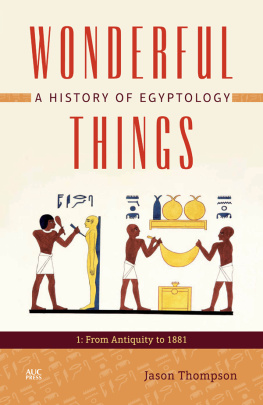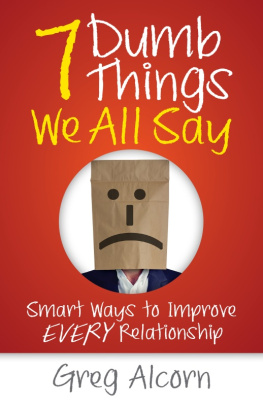Jason Thompson - Emotionally Dumb: An Overview of Alexithymia
Here you can read online Jason Thompson - Emotionally Dumb: An Overview of Alexithymia full text of the book (entire story) in english for free. Download pdf and epub, get meaning, cover and reviews about this ebook. year: 2009, publisher: Soul Books, genre: Romance novel. Description of the work, (preface) as well as reviews are available. Best literature library LitArk.com created for fans of good reading and offers a wide selection of genres:
Romance novel
Science fiction
Adventure
Detective
Science
History
Home and family
Prose
Art
Politics
Computer
Non-fiction
Religion
Business
Children
Humor
Choose a favorite category and find really read worthwhile books. Enjoy immersion in the world of imagination, feel the emotions of the characters or learn something new for yourself, make an fascinating discovery.
- Book:Emotionally Dumb: An Overview of Alexithymia
- Author:
- Publisher:Soul Books
- Genre:
- Year:2009
- Rating:3 / 5
- Favourites:Add to favourites
- Your mark:
- 60
- 1
- 2
- 3
- 4
- 5
Emotionally Dumb: An Overview of Alexithymia: summary, description and annotation
We offer to read an annotation, description, summary or preface (depends on what the author of the book "Emotionally Dumb: An Overview of Alexithymia" wrote himself). If you haven't found the necessary information about the book — write in the comments, we will try to find it.
Emotionally Dumb: An Overview of Alexithymia — read online for free the complete book (whole text) full work
Below is the text of the book, divided by pages. System saving the place of the last page read, allows you to conveniently read the book "Emotionally Dumb: An Overview of Alexithymia" online for free, without having to search again every time where you left off. Put a bookmark, and you can go to the page where you finished reading at any time.
Font size:
Interval:
Bookmark:
First published in 2009
by Soul Books
Copyright: Jason Thompson 2009
All rights reserved. No part of this book may be reproduced in any material or electronic form without purchase or written permission from the copyright holder, except by a reviewer who may quote brief passages in a review.
Applications for the copyright owners written permission to reproduce any part of this publication should be addressed to the publisher Soul Books at hippolytus_101@yahoo.com.au
Warning: The doing of an unauthorized act in relation to a copyright work may result in both a civil claim for damages and criminal prosecution.
National Library of Australia Cataloguing-in-Publication-Data
Thompson, Jason. Emotionally Dumb: an overview of alexithymia
1st ed.
Bibliography
Includes index
ISBN 978-0-646-51251-8 (E-book)
1. Emotional Intelligence. 2. Alexithymia. 3. Imagination
For Alice and Peter
whose voices will be heard
Introduction
Chapter 1 - What Is Alexithymia? 8
~Description
~Difficulty identifying and describing feelings
~Impaired imagination
~Thinking style bound to the external world
Chapter 2 - How Is Alexithymia Caused? 12
~Biogenic alexithymia
~Psychogenic alexithymia
~Primary and secondary alexithymia
~Neurological structures thought to be involved
Chapter 3 - What Alexithymia Is Not 15
~Psychopathy/sociopathy
~Schizoid personality disorder
~Stoicism, and repression of emotions
~Normative male alexithymia
~Shyness and social phobia Apathy
Chapter 4 - Overlapping Concepts and Co-morbidities 20
~Autism and Aspergers syndrome
~Obsessive compulsiveness
~Eating disorders
~Posttraumatic stress disorder
~Personality disorders
~Depressive and anxiety disorders
~Psychosomatic disorders Substance abuse
~Physical diseases and injuries
Chapter 5 - Associated Characteristics and Behaviours 25
~Communication style
~Anhedonia and negativity
~Hypochondria
~Sleep disturbances and poverty of dreams
~Involuntary emotional expression
~Intimate relationships
~Alexithymia in old age
Chapter 6 - Alexithymic Parenting 30
~Difficulty identifying feelings
~Misattunement and misinterpretation
~Random unregulated emotion discharging
~Exploitation of childrens cognitive abilities
~Mechanical, externally oriented cognitive style
~Family relationships and support issues
Chapter 7 - Therapy and Self-Help 36
~Biofeedback Imaginal feedback Self-help
~Family therapy
~Pharmacology
Chapter 8 - Assessment 45
~How do I tell if I have alexithymia?
~Beth Israel Questionnaire
~Toronto Alexithymia Scale
~Bermond-Vorst Alexithymia Questionnaire
~Alexithymia Questionnaire for Children
~Online Alexithymia Questionnaire
~BarOn Emotional Quotient Inventory
~Scored Archetypal Test
~Two-Factor Imagination Scale
Chapter 9 - An Exploration of Alexithymia and Metaphor 53
Chapter 10 - Emotional Intelligence is really Imaginal Intelligence 58
AFTERWORD: A note on Classification 63
APPENDIX A: Two-Factor Imagination Scale 64
REFERENCES 98 67 READING MATERIAL 105 73
To launch into a description of low emotional intelligence or alexithymia is timely, for interest in the subject has grown dramatically since its original description in the early 1970s (Sifneos 1973). With the 1996 publication of Daniel Golemans Emotional Intelligence came a further leap in popular understanding of the value of emotional skills for leading a fulfilling life, and conversely of the vicissitudes one may face without a good grasp on these skills. Since Golemans publication, emotional intelligence or EQ has been studied in hundreds of thousands of individuals and results have provided a better understanding along with new methods for improving emotional capabilities. The initially separate constructs of alexithymia and emotional intelligence came to the attention of researchers who realized they were intimately related, with alexithymia representing the lower possible range of emotional intelligence. This realization has spawned a rich cross-fertilization of ideas, whereby aspects of each construct may be considered as opposite ends of a single emotional abilities spectrum.
Alexithymia is known to accompany a broad variety of medical and psychiatric illnesses, ranging from cancer or psychosomatic conditions to personality and posttraumatic stress disorders, touching the lives of thousands of sufferers and those in close relationships with them. The alexithymic person is unable to discriminate the usual nuances of emotional life, leading to immense difficulties in personal and interpersonal functioning. To feel and speak ones emotions seems a most basic human ability, so it is hard to imagine individuals incapable of recognizing and speaking about their most basic feelings. These difficulties are compounded by the lack of accessible (i.e. non-academic) texts on the subject. I hope therefore that the straightforward description of alexithymia in this book will increase general understanding of the condition. I further hope that an increase in understanding may help, both directly and indirectly, those most affected in coping with the condition.
In everyday language the terms feeling and emotion are often used inter-changeably. In this volume I will be using these terms in their more strict psychiatric sense where emotion refers to physical arousal evidenced by such signs as smiling, crying, laughing, body tension, blushing, tight stomach, posturing, voice intonation, elevated pulse, etc., and where feeling refers to ones mental recognition, understanding, and verbal accounting of the manifestations of emotional arousal. Alexithymic individuals may display full-blown emotions, but they do not necessarily understand the significance of these emotions on a mental level. To put it another way, alexithymia involves an essential deficit in ones ability to evaluate feelings, but not in the realm of emotional excitation.
Alexithymia may be to some degree a universal feature in all human beings, where we each display some anxiety, sadness or melancholia that is obvious to onlookers but not to ourselves; until someone points out You look a little anxious and we suddenly realize we have been in the grip of a mood of which we had little awareness. Likewise we may not recognize when even our closest intimates show signs of irritation, anger or other emotion until they spell it out for us. Those with extreme alexithymia share this propensity but in a radical way; they rarely, if ever, have a clear sense of emotional states in themselves or others, and it is this pervasive deficit that researchers of the last few decades have sought to understand and define.
My interest in Archetypal Psychology combined with an intimate involvement with alexithymic individuals has fostered a keen interest in this subject, and led to the construction of an alexithymia questionnaire (see appendix) for those wanting an indication of their alexithymia level before undergoing the rigmarole of sourcing and financing a more thoroughgoing clinical assessment. In the following pages I will attempt to faithfully restate the findings of some of the main research on the subject to date, while comparing and contrasting alexithymia with a variety of subjects to provide a clearer picture of the condition. Throughout the book you will find a persistent mention of the stunted alexithymic imagination, particularly in the latter half of the book where I posit that these individuals may unlock their absent emotional understanding by gaining a better access to spontaneous imagination.
Font size:
Interval:
Bookmark:
Similar books «Emotionally Dumb: An Overview of Alexithymia»
Look at similar books to Emotionally Dumb: An Overview of Alexithymia. We have selected literature similar in name and meaning in the hope of providing readers with more options to find new, interesting, not yet read works.
Discussion, reviews of the book Emotionally Dumb: An Overview of Alexithymia and just readers' own opinions. Leave your comments, write what you think about the work, its meaning or the main characters. Specify what exactly you liked and what you didn't like, and why you think so.













